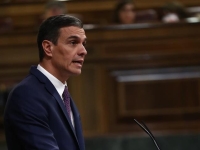Politics
Autonomy in strategic sectors will be a priority of the Spanish Presidency of EU
In the second half of the year
USPA NEWS -
Achieving autonomy from the European Union in strategic sectors has become a necessity highlighted by the war in Ukraine. The European partners have learned valuable lessons in this conflict, which on February 24 will mark one year since its outbreak, and Spain, which will assume the EU Presidency on July 1, has proposed to advance in that objective. According to the President of the Spanish Government, Pedro Sánchez, "a fair response to the crisis caused by the war in Ukraine not only serves to protect the social majority; it is also an investment that rearms and legitimizes the European project."
Pedro Sánchez appeared in Parliament, where he announced that Spain will work to reinforce autonomy in strategic sectors. In addition, he stated that his proposals on energy in Europe and the agreed measures to protect families and companies have alleviated the effects of the war in Ukraine in Spain. The President of the Government assured that Spain will continue to support Ukraine throughout the duration of the occupation and also in its task of reconstruction. In this regard, he stressed that his Government has allocated 38 million Euros of humanitarian aid to the conflict zone and that 164,000 Ukrainians have received temporary protection and reside in Spain with full rights.
In addition, he recalled that the European Union has once again shown unity, firmness and determination in the military, political, economic and humanitarian fields with the Ukrainian people. "Ukraine not only resists an invader, it resists a reactionary discourse that questions the values of the European project," said Pedro Sánchez. In his opinion, the diagnosis must be correct and the risks and challenges we face must not be hidden from citizens: "We have never sweetened reality, nor have we painted idyllic scenarios because the risks are there. They continue to exist and continue to have real impact on our society," he said.
The response to the consequences of the war is situated in two spheres: national and European. At the national level, the President of the Spanish Government stressed that 45,000 million Euros have been mobilized. Spain has ended 2022 with an economic growth rate of more than 5% and with the lowest inflation in Europe, with a record number of Social Security affiliates and the lowest unemployment in the last 15 years.
At the European level, the Spanish Government has led measures in Brussels such as the centralized purchase of gas from third countries; the promotion of renewable energies; the reform of the electricity market; the destination of European funds for the green transition; intervention in the price of the gas that generates electricity, the so-called "Iberian solution"; and the promotion of energy interconnections. "Today Spain exports solutions to the energy and price crisis, unlike 10 years ago," said Pedro Sánchez.
Spanish Presidency of the EU
The President of the Spanish Government assured that Spaniards feel they are European citizens and trust that they will face threats from the European project. In his opinion, it is essential to advance in open strategic autonomy, that is, in how to gain European sovereignty. That means having the capacity to decide in key sectors for economic, health, defense, technological and industrial development. Strategic autonomy will be one of the main priorities of the Spanish Presidency of the European Union in the second half of this year. "A challenge in which we will work to reduce vulnerabilities and strengthen our autonomy in strategic sectors," announced Pedro Sánchez.
At the European Councils held in October and December 2022, two themes dominated the debates: energy and the European response to the US Inflation Reduction Act. In this sense, the President of the Spanish Government specified the position of Spain before the approval by the United States Government of the Inflation Reduction Law, which implies that this country will allocate almost USD 370 million to subsidize investments in its territory linked to the ecological transition. In his understanding, this goal is good for fighting climate change, but "it cannot be achieved at the cost of deindustrialising Europe." For this reason, the Spanish Government is working to reach an agreement that excludes European products from the most protectionist clauses of that law.
According to Sánchez, it is necessary for the European Commission to present a coordinated response plan in the coming days to improve Europe's industrial resilience, its global competitiveness and, at the same time, preserve the integrity of the single market. This plan must include regulation, financing and reform measures of the State aid framework to make it more agile and adapted to the current context, including the acceleration of recovery and resilience plans. "Crucial investments are at stake and the ability of the European Union to maintain its global competitiveness and its industrial fabric in an international geopolitical context marked by the protectionist drift of powers such as the United States, China or India," he said.
Liability for this article lies with the author, who also holds the copyright. Editorial content from USPA may be quoted on other websites as long as the quote comprises no more than 5% of the entire text, is marked as such and the source is named (via hyperlink).






